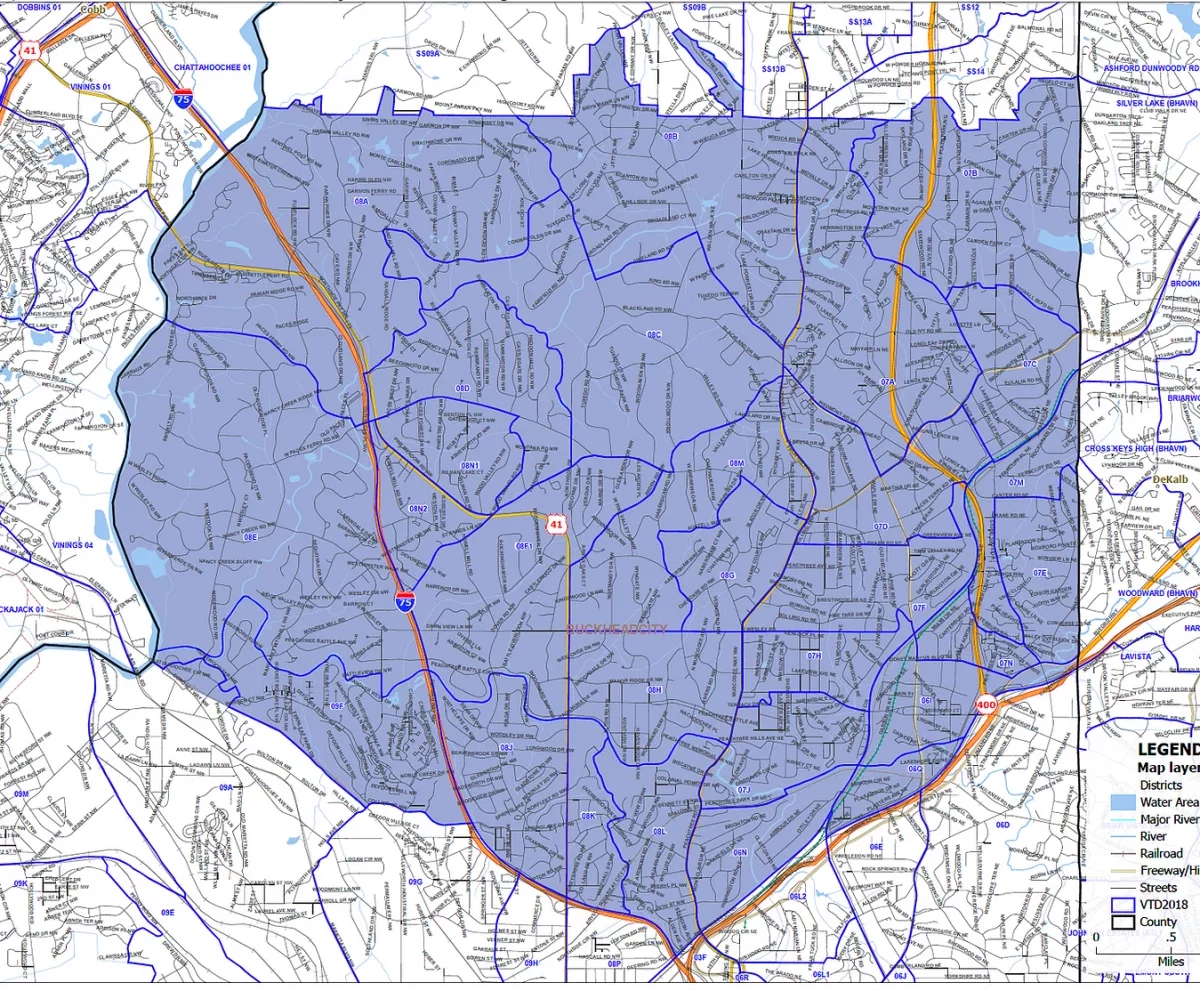Local residents are forming a new Buckhead cityhood opposition group they say is so new and grassroots it doesn’t yet have a formal name.
The group’s reserved website is tentatively using Buckhead for United Atlanta. It is also using the social media hashtags “#NoBC” and “#YesATL” on its Twitter account.
Caren Solomon Bharwani, a resident of the Margaret Mitchell neighborhood and immediate past president of North Atlanta Parents for Public Schools (NAPPS), is one of the dozen or so residents on the new group’s steering committee. She says she joined due to concerns about political division and public schools impacts, saying Atlantas should “lift each other up and try to be one city, not one Buckhead.”
Another co-founder is Michael Handelman of Underwood Hills, a Northwest Atlanta neighborhood outside the commonly understood borders of Buckhead but one of several included in the broader cityhood map. Handelman said he and his neighbors learned of the cityhood effort through mailers and were “shocked and aghast” it included them. He views it as an imposition by outsiders without local input.
“We don’t see why people are coming into our community and claiming to represent us when they just don’t,” said Handelman. “These people aren’t even elected… From all impressions, they seem to be pushing their ideas on us and not the other way around.”
Handelman and Solomon Bharwani both said the group is grassroots and independent, but is informally in contact with the Committee for a United Atlanta (CUA), an anti-cityhood group formed by prominent political and business leaders.
The pro-cityhood Buckhead City Committee (BCC) tried to cast doubt on the new group’s independence and dismissed the notion of the cityhood effort being a surprise.
“Sounds like this is the work of the City of Atlanta’s organized opposition,” said Bill White, the BCC’s chairman and CEO, in an email. He noted that BCC has held various public meetings and promised that there “will be dozens more during our campaign next year.”
“Anyone who is just now learning, and thank God, that it’s taking the entire Georgia Legislature to come to Buckhead’s rescue because our local legislators, Betsy Holland and Jen Jerdin [sic], refuse to do a damn thing to help us, has been living under a rock,” added White.
He was referring to state Rep. Betsy Holland and state Sen. and state Attorney General canddiate Jen Jordan, who, like all other state legislators who represent Buckhead, oppose cityhood. (The sponsors of cityhood legislation are all Republicans from outside Atlanta.) Holland’s spouse Jason has been serving as an informal adviser to the new community group and acting as its go-between with the CUA, according to Solomon Bharwani.
“We don’t want to compromise anything they’re doing,” she said of CUA. “While we’re not affiliated with them, we’re certainly in touch with them.”
Jason Holland downplayed his role, saying that it’s “flattering that Caren thinks I have that much influence. The reality is that I made a couple of introductions hoping to get people to connect on this issue.”
The CUA could not immediately be reached for comment.
The BCC says forming a new city would allow for a large boost in the local police force, create better city services, and have such side effects as boosting business development. The cityhood group also claims that Atlanta would benefit as well by having fewer services to provide and a smaller area to police.
Solomon Bharwani said that the new opposition group’s main plan is to share “the absolute truth, without empty promises, about what this means for the entire city of Atlanta” and effects on business development, public schools and property taxes. The intent is to act as a community-based resources as contrasted with the CUA’s major political lobbying and fundraising, she said.
“My message is we are grassroots,” said Handelman. “This is people meeting at homes, meeting online. We’re not sitting in fancy skyscrapers. We’re not meeting in boardrooms.”
He said the members are volunteers and currently have no funds. He said they are willing to sacrifice personal time on the effort “because if this horrible idea goes through, there’s no going back and it’s going to impact Atlanta for generations to come.” He called the cityhood idea a “very sad thing” and a “division” in “our city in the Beloved Community of Atlanta” — a reference to term popularized by Martin Luther King Jr. about a world that has eliminated bigotry, poverty and violence.
Solomon Bharwani is a Buckhead native who said her family has lived there about 70 years. She said her overall reason for joining the opposition to cityhood is “the dramatic effects it could have on the rest of Atlanta,” and questioned the crime-fighting promise that is its key political driver. “And I do believe that generational poverty is at the root cause of a lot of the crime in Atlanta,” she said, “and pulling away and taking money away and taking resources away from the city is not the way to fix it.”
Atlanta Public Schools (APS) are, of course, another concern for her. She said she attended APS, where “living with people who are not lily white and wealthy, quite frankly, it prepared me for a different world.” Her three children now attend APS as well and she continues to serve on the executive board of NAPPS, which recently announced its intent to join the Atlanta Board of Education in opposing cityhood.
Cityhood opponents say APS likely will not be able to legally operate in Buckhead, throwing many students out of the system and blowing an enormous hole in its tax revenues. White, the BCC head, has acknowledged that an APS pullout would be a problem and that the law on the unprecedented cityhood situation is unclear. But he also says BCC is confident that APS would find a way to continue to operate in Buckhead because it needs the revenue.
“I feel like my kids will be OK no matter what,” says Solomon Bharwani, but she is concerned about the overall impact on APS and its students. The BCC’s argument, she says, amounts to saying, “‘Trust us. Do you really think we would leave these students behind?’ Yes, I think you would, absolutely.”
“Hope is not a strategy and that is all the detail that we got from the Buckhead City Committee,” she said.





